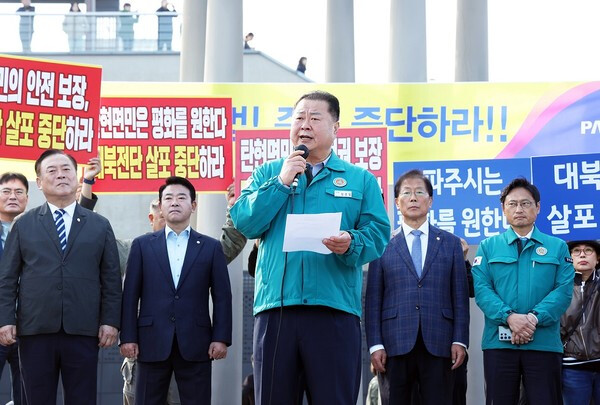
PAJU, GYEONGGI PROVINCE – Tensions flared at the inter-Korean border in Paju on Tuesday as a group representing families of South Koreans abducted by North Korea attempted to send propaganda leaflets across the heavily fortified frontier. The action by the Families of Abductees to North Korea was met with staunch opposition from local residents and civic organizations, who fear it will provoke further retaliation from Pyongyang.
The abductee families, numbering around 20 individuals, convened at Imjingak Peace Land, a site frequently used for such symbolic acts, to conduct an event they titled "Sending News to Abducted Families." Their plan involved releasing helium balloons carrying leaflets containing photographs and personal information of six abductees, alongside controversial printed materials depicting North Korean leader Kim Jong Un in a prison setting. Initial attempts to launch ten such balloons were thwarted by unfavorable wind conditions, leading to a postponement of the operation until later in the evening.
A spokesperson for the abductee families defended their actions, questioning whether "wanting to know the fate of our families is a crime." They further cited a recent legal victory granting them the right to proceed, albeit with the condition that the leaflets adhere to aviation safety regulations, including a weight limit of two kilograms, which they claim to have observed.
However, their efforts were met with direct resistance from residents living within the Civilian Control Line and various civic groups. Demonstrators mobilized tractors and staged protests, asserting that the leaflet campaigns endanger the lives and livelihoods of Paju citizens. They highlighted the severe noise pollution experienced by border residents following North Korea's recent resumption of loudspeaker broadcasts, triggered by previous South Korean leaflet dispersals. These residents argue that the abductee families' actions prioritize their own grievances over the safety and well-being of the local community.
The Paju City government has taken a firm stance against the leaflet launches. In an official statement, the city administration condemned the activity, arguing that it provides justification for North Korea's provocative actions, including the recent barrage of trash-filled balloons and the resumption of loud propaganda broadcasts, thereby placing Paju citizens at direct risk. The city vowed to employ all available administrative and legal measures to prevent future leaflet distributions.
Reinforcing this stance, Gyeonggi Province has designated the border region as a disaster safety zone since October of the previous year. This designation allows for the deployment of special judicial police to actively intercept and prevent any attempts to disseminate leaflets into North Korea.
In a direct appeal to the abductee families, Kim Seong-joong, the First Vice Governor of Gyeonggi Province, and Paju Mayor Kim Kyoung-il met with their representatives on Tuesday. During the meeting, they earnestly requested the families to exercise restraint and refrain from proceeding with the leaflet launch, emphasizing the potential for escalating tensions and endangering the local population.
The confrontation at Imjingak underscores the delicate and precarious security situation on the Korean Peninsula, where acts intended to highlight human rights issues in North Korea often clash with the immediate safety concerns of border residents. The incident serves as a stark reminder of the complex interplay between freedom of expression, national security, and the well-being of communities living in close proximity to a hostile border. The delayed launch suggests a potential impasse, with the abductee families determined to proceed and local authorities equally resolute in their efforts to prevent them.
[Copyright (c) Global Economic Times. All Rights Reserved.]






























